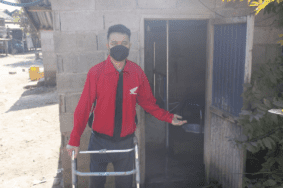Increasing Independence for People with Disabilities through Home-based Modifications
July 5th, 2022 | Stories
Khanthavong with his newly completed ramp to access to his toilet. Photo by QLA CBID Facilitator.
Ever since I became paralyzed, doing small things has never been easy for me. My limited movement hindered my ability to move around, even to the toilet. After I received a wheelchair, the Community-Based Inclusive Development (CBID) team helped modify the entrance to my toilet, and installed handrails. Now I can access the toilet independently and more conveniently.”
-Khanthavong
Mobility limitations can make completing personal hygiene tasks, like using the toilet, a challenge for people with disabilities. Often these personal and private tasks require help from a caregiver. Physical barriers such as steps or narrow doorways make it more difficult and sometimes impossible to access toilets if a person uses a wheelchair or has difficulty walking.
The USAID Okard project Community-Based Inclusive Development (CBID) interventions not only help people with disabilities in Laos access rehabilitation and assistive products, but also consider how home modifications can remove physical barriers and enable effective use of assistive products to increase mobility and participation in everyday activities like self-care and household chores.
62-year-old Khanthavong was referred to the Provincial Health Rehabilitation Center to assess his health. The facilitator, trained by World Education, worked with Khanthavong and his caregiver to identify the challenges he faces with washing, cleaning, and using the bathroom, and developed solutions. Khanthavong received a wheelchair to improve his mobility, and home modifications were made, including building a ramp to the toilet, a toilet chair to sit on, and handrails to help Khanthavong move from his wheelchair to the toilet chair and back independently. Having an accessible toilet increases convenience, independence, and quality of life for Khanthavong.
 Khamparn and his modified toilet with handrails and toilet chair. Photo by QLA CBID Facilitator.
Khamparn and his modified toilet with handrails and toilet chair. Photo by QLA CBID Facilitator.
Khanthavong is not the only person to receive home modifications. Khamparn also experienced similar barriers due to difficulties in mobility. Through case management, Khamparn received a walking frame to help him move around, but steps around the house still presented challenges in his daily activities.
Khamparn expressed concerns with accessing his bathroom and completing personal hygiene tasks. Together, the CBID team and Khamparn discussed what assistive products and home modifications would help, and the CBID team provided a toilet chair and installed handrails so he can easily move around his bathroom.
Khamparn is happy to be able to wash and use the toilet by himself, as his caregiver this is an improvement to his well-being. Sometimes he feels uneasy asking for my assistance to take him to the toilet, but now he can go on his own.” – Khamparn’s caregiver
The USAID Okard project works to improve and sustain the optimized functional ability and independent living of persons with disabilities in Laos. In 2021, Okard reached 937 people with health and rehabilitation services, including assistive products.
World Education fosters enduring partnerships across regions and sectors to advance education outcomes for all. We offer education systems strengthening, program design and implementation, applied research and evaluation, capacity development, and policy development services.